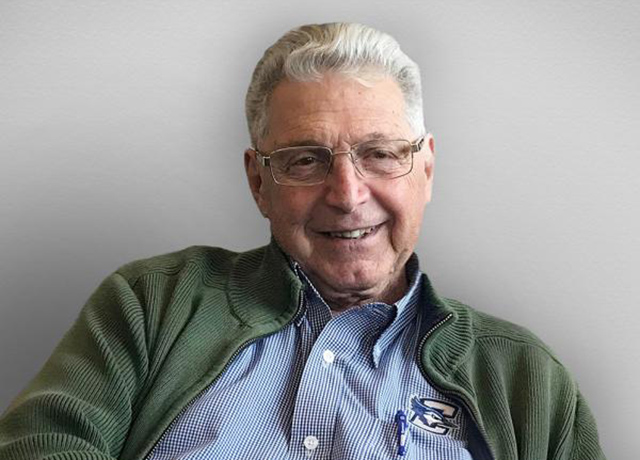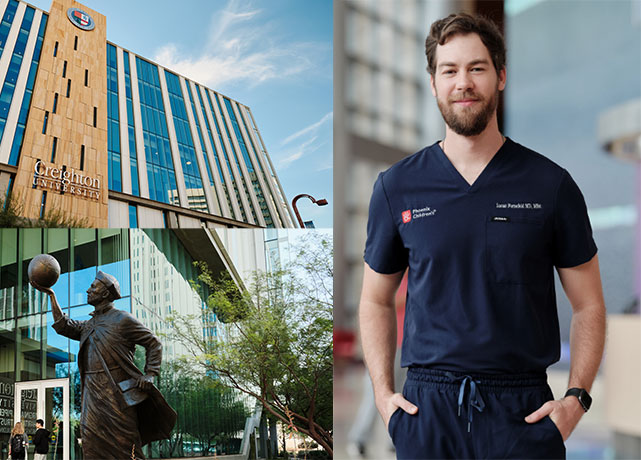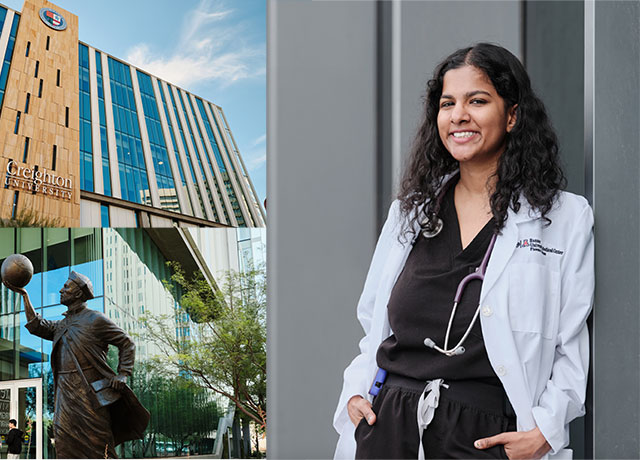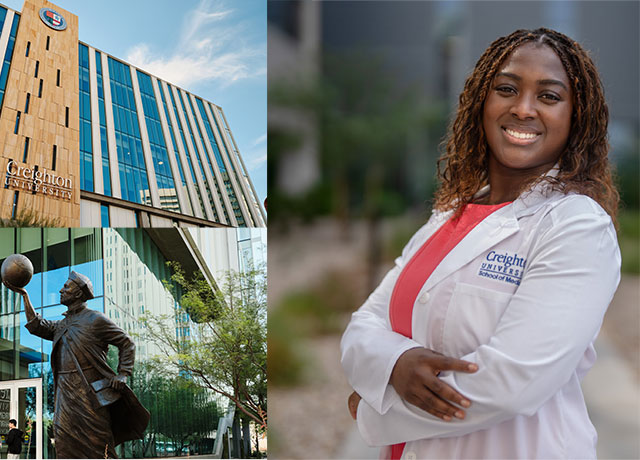Featured Testimonial About Creighton University
The goodness of people at Creighton and in Nebraska changed me dramatically. The town was giving, the instructors were giving, the physicians were giving. They were so kind and considerate and excellent.


James Laumond, MD’64, knew he wanted to be a doctor since he was 2.
What led him down the path of the medical profession was, of all things, being mauled by a dog. It happened when Laumond’s sister was babysitting him. He wandered off, opened a door he wasn’t supposed to. A dog jumped out and went for his face.
Nearly 80 years later, Laumond doesn’t really recall the incident, but his sister and parents relayed the specifics to him over the years, the tale becoming a part of family lore.
Laumond was rushed to the emergency room, where a doctor sutured together his face, and all the while Laumond remained calm and inquisitive, asking questions — specific, insightful questions — about what the doctor was doing. Later the doctor told Laumond’s parents the brave 2-year-old was one of the best patients he’d ever treated.
“From that point on,” Laumond said, “I never wanted to be anything but a doctor.”
The story says a few things about Laumond. It speaks to an inherent fearlessness and curiosity, which have benefited him in life (when they weren’t getting the self-described “wild son of a gun” into trouble). The story also touches on — and might in fact be the origination of — one of Laumond’s core values: the humanistic bond between doctor and patient that lies at the heart of good medicine.
So much of what Laumond has given of himself — as a doctor, as a philanthropist, as a person — has gone to support this cause. He’s spent his life trying to be the most complete doctor he could be. Now he’s helping to ensure that Creighton University can continue educating more doctors like him, physicians caring not just for their patients’ bodies but their souls. The whole person.
“When I die, I don’t want my legacy to be that I was a rich man,” Laumond said. “I want my legacy to be that I was a generous man. That I learned to give. What little part I can do, I will do.”
Laumond has been an astute investor in California real estate and has converted several of his properties into charitable trusts designed to fund a $2 million endowed scholarship fund in the School of Medicine.
Most recently, he transferred a large portion of his ranch into a charitable trust that will fund a nearly $5 million endowment for the University’s Collaborative Care program. Creighton is a national leader in teaching Collaborative Care — a team-based approach to care drawing on the shared knowledge of medical professionals to deliver better (and more humanistic) overall patient care.
Laumond has also made an outright gift of land to the University: a 205-acre parcel from his ranch near San Jose, California. The University has sold the property, and the proceeds will be used to fund the Dr. James P. Laumond Endowed Chair in Medicine. Laumond said he hopes his gifts will help to promote humanism in Creighton-educated physicians.
“Dr. Laumond’s gifts help us form physicians who communicate with patients in a manner that makes each individual realize that they are important to us,” said School of Medicine Dean Bo Dunlay, MD’81. “We emphasize the importance of nonverbal as well as oral communication. His support helps us to continue to attract and graduate distinctive Creighton physicians.”
The next to last of a large family, Laumond grew up in a poor neighborhood in San Francisco. He was the first in his family to go to college. Creighton’s was the first medical school to accept the University of California, Berkeley, business student. Laumond’s father loaned him the $100 he needed to secure his spot in class.
Before coming to Creighton, he’d never even left his home state. The shift was painful at first. In fact, a homesick Laumond hitchhiked back to San Francisco his freshman year, unsure if he’d return to Nebraska. But he made it back, thanks to some help from a professor, and went about the belated business of falling in love with Creighton at second sight.
“I started to see the qualities, the goodness of people at Creighton and in Nebraska,” he said. “That changed me dramatically. The town was giving, the instructors were giving, the physicians were giving. They were so kind and considerate and excellent.”
The University, he said, gave him the tools he needed to be the doctor (and person) he was meant to be, the kind of physician who could connect with his patients on a deeper and more meaningful level.
Coming to Nebraska also steered him toward a life of farming and ranching.
Throughout the school year, Laumond took jobs at family-owned farms in Nebraska, Iowa and South Dakota, despite not having done a minute of farming before coming to the Midwest. He recalled the kindness of the families, who offered him comfortable room and board, and gave him time to study at night before driving him back to Omaha on Monday mornings in time for class.
These experiences sparked in Laumond a lifelong love of the Good Life, albeit not necessarily in Nebraska. Laumond now lives and works on his ranch near San Jose, with his dogs. (He still loves dogs, despite that early childhood incident.)
After graduating Creighton, Laumond stuck around rural Nebraska for a time, converting an old bank in Ashland to his doctor’s office. The bank’s vault served as a separate exam room.
A call from Uncle Sam marked the end of his tenure in Nebraska. After two years of service, Laumond moved back to California’s Bay Area and started investing in real estate and founding medical facilities, including an urgent care office.
Coming from a rough background himself, Laumond had a passion for serving the underserved.
“All kinds of people, it didn’t matter who they were, it didn’t matter how much money they had,” he said. “When it comes to sickness and health, everyone deserves the same benefits. There was no distinction between the privileged and underprivileged in my office.”
From his office near San Mateo, he saw migrant workers at a horse racing track with serious health issues and no medical care and became the personal physician to many of them. He established an Independent Physicians Association and led an effort to have the annual proceeds from unclaimed winning bets used to staff and operate an onsite clinic. Laumond cites this as his proudest achievement.
In these cases, in all cases, Laumond practiced “the art of medicine,” which he defines as “making a patient feel comfortable and loved, letting them know you’re on their side, and they’re going to get the best possible care for you. That’s humanism in medicine.”
That’s the kind of care a 2-year-old boy received in a San Francisco emergency room 80 years ago, when what might have been a traumatic experience transformed into a future Creighton doctor discovering his life’s calling, much, much earlier than most.


